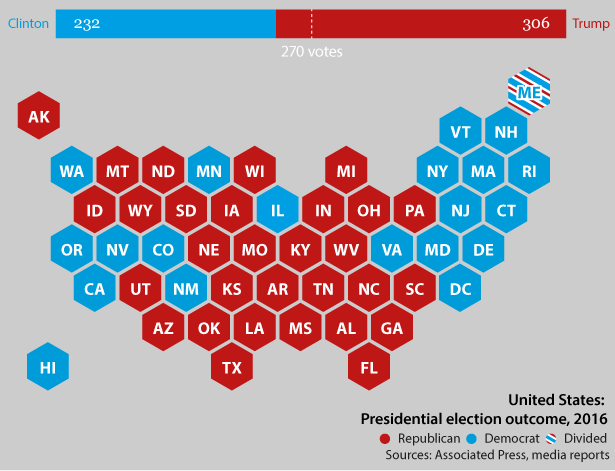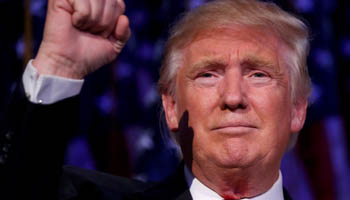Trump win will test US allies and institutions
The election upset places an anti-system candidate at the head of a divided party and a vast policy-making apparatus
Republican presidential candidate Donald Trump defeated Democrat rival Hillary Clinton in the Electoral College, it was announced today, defying her polling lead and nearly all predictive models. With Republicans retaining their House and Senate majorities too, Trump is in a position to take unilateral action via his powers as chief executive, battle with Republican leaders and the Democratic minority to set the legislative agenda, challenge his political adversaries for leadership of the party, and define Washington's global role for the next four years as commander-in-chief. However, investors, foreign capitals, corporates and the US public uncertainly await further clarification of the unorthodox candidate's policy programme after discounting his electoral viability and campaign promises.
What next
The significant shock to confidence -- both that of investors and US security partners -- is likely to persist at least until Trump takes office in January. Politically, Trump is likely to begin his term with policy changes where he can either act unilaterally under executive authority or enjoy support from congressional Republicans, such as blocking proposed trade deals (instead of unravelling enacted arrangements), cuts to non-defence expenditure, stricter immigration policy and withdrawing US climate commitments.
Subsidiary Impacts
- Senate Democrats under probable Minority Leader Chuck Schumer are likely to adopt a confrontational stance against the White House.
- Election-related market volatility may slow the pace of US interest rate rises next year.
- Further US disengagement from the Syrian civil war is likely, to the benefit of President Bashar al-Assad.
- Puerto Rico Governor-elect Ricky Rossello is unlikely to find allies in Washington for his pro-statehood agenda.
Analysis
Softer turnout by Democratic-leaning constituencies and a significant uptick in rural white voters without a college education for the Republicans meant that the favourable pre-election polling for Clinton -- combined with assumptions of voter behaviour based on the small data set of previous elections -- did not reflect the actual makeup of the 2016 electorate (see US/INT: Trump highlights election predictive pitfalls - June 21, 2016).
Policy impact
Trump waged an 'insider-outsider' campaign devoted to challenging the political status quo, rallying voters around animus for Clinton, and defying political conventions rather than engaging in discrete policy debates.
Significant uncertainty surrounds Trump's intentions and ability to enact his broad domestic priorities due to several factors, including:
- the willingness and ability of the legislative and judicial branches to defy Trump's more controversial proposals;
- the likely Trump team's relative inexperience in government;
- Trump's fraught relationship with the more moderate and pro-business wing of congressional Republicans, such as Speaker of the House Paul Ryan (see UNITED STATES: Speaker Ryan will not unify Congress - November 2, 2015); and
- the relative lack of policy detail required on the campaign trail compared to making discrete decisions once in office.
Public statements during the transition period and the staffing of key policy positions will be early indicators of Trump's willingness to cooperate with mainstream Republicans.
Trump is likely to reverse most of Obama's policy legacy upon taking office
It is likely that the Trump administration, through legislation and executive action, will oversee reversals of a significant part of his predecessor President Barack Obama's legacy, including:
- the Affordable Care Act ('Obamacare');
- the Clean Power Plan (see UNITED STATES: Prices and policy squeeze coal sector - January 26, 2016);
- ratification of the (COP21) Paris Agreement;
- US rejection of the Keystone XL pipeline;
- US sanctions relief supporting the Iran nuclear deal (see IRAN: Risks to nuclear deal are rising - June 15, 2016); and
- the Consumer Financial Protection Bureau (CFPB) (see UNITED STATES: Low-growth economy will shape politics - October 11, 2016).
Trump's plans for an expansive programme of infrastructure spending, financed by private investment and public borrowing, face a more fraught legislative path with deficit-sceptical congressional Republicans. A more modest programme, financed by cuts to other areas of public expenditure, is a more likely prospect (see UNITED STATES: Infrastructure boom is unlikely - October 28, 2016).
Trade pacts
A Trump administration also means that the Trans-Pacific Partnership (TPP) and Trans-Atlantic Trade and Investment Partnership (TTIP) will probably be blocked by Washington.
Trump may push for renegotiation of NAFTA before actively threatening withdrawal
Trump may threaten swift US withdrawal from the North American Free Trade Agreement (NAFTA). However, the tight integration of the Canadian and Mexican economies with that of the United States and the substantial disruption caused by a unilateral withdrawal means that strong pressure from Washington to renegotiate the pact is likely to be an opening manoeuvre. There is, though, a notable chance of a US withdrawal should talks bog down (see MEXICO: Weak peso may yet bring trade boost - November 8, 2016).
Immigration
Given the central role of immigration in Trump's campaign, it is likely that federal enforcement actions against undocumented immigrants will increase, though a full-scale mass deportation policy would prove highly contentious, face legal challenges and cause economic disruption.
Trump may choose to imbue more gradual measures -- such as increased border security funding, greater restrictions on asylum seekers, and expedited deportation processes -- with symbolic significance as 'tackling' his immigration pledges while promising further action in the future should he run into preliminary resistance (see MEXICO-US: Wall will divide, whether built or not - September 6, 2016).
Supreme Court
Impending Republican control of the White House also means that the Senate will continue its block on Obama's Supreme Court nominee. Once in office, and with a continued Republican majority in the Senate, Trump will be in the position to set the Court's balance with conservative justices for some time.
Foreign policy
Trump's victory will see US allies seek quick reassurance of Washington's commitments to its security arrangements, international law and participation in multilateral institutions; none of these are likely to be forthcoming from an inward-looking Trump administration (see today's INTERNATIONAL: US foreign policy uncertainty abounds).
Moscow, in particular, is likely to see opportunities to 'reset' relations with the United States but will exploit Trump's perceived naivete to pressure NATO and Europe and gain ground in Syria (see today's RUSSIA: Moscow will exploit Trump's softer line). In Beijing, the uncertainty and instability that a Trump victory may bring to regional affairs offsets, for now, at least, any perceived weakening of Washington's international prestige (see today's CHINA: Trump victory brings more risks than benefits).
Some bilateral relationships may improve as a result of muted US criticism as part of a hands-off Trump foreign policy, particularly with non-democratic US allies, but many traditional US security partners in East Asia and in NATO will probably pursue greater defence expenditure and deepen ties with like-minded neighbours (see UNITED STATES: Allies will seek reassurance - October 21, 2016).
Party-political impact
Trump's unanticipated win will throw the Democrats into disarray and force introspection by mainstream Republicans as they prepare for a Trump presidency.
Democrats
Clinton's loss and Republican congressional majorities leave the Democratic Party without a high-profile leader possessing a national electoral mandate to rally around in anticipation of future contests.
After winning the Democratic nomination in part due to her ostensible electability, Clinton's loss will embolden the progressive wing of the party to take a harder line on key issues, particularly:
- climate and energy policy;
- financial regulation; and
- opposition to trade liberalisation (see UNITED STATES: Sanders will make exit cost Clinton - May 9, 2016).
When combined with an unfavourable slate of states for Democrats to defend in the Senate races of the 2018 midterms, internal divisions are likely to take priority on the left until stronger national candidates emerge from statehouses and Congress.
Republicans
Ryan, who maintained an arms-length relationship with the Republican candidate through Election Day, is likely to find his speakership -- and calls for a more moderate brand of conservatism -- severely undermined within the party. He could face a leadership challenge tacitly or explicitly backed by Trump (see UNITED STATES: Republicans face splits beyond Trump - March 17, 2016).
Trump-sceptical national security hawks and pro-business conservatives will seek to boost more mainstream advisers into White House circles and push Trump to adopt orthodox policy positions.
However, given Trump's antagonistic relationship with the party elite, calculations of political expedience will guide his interactions with this group, particularly on areas of lesser importance to Trump's platform, such as fiscal policy, where differences of opinion on entitlement reform can be smoothed over by mutual agreement on tax cuts, deregulation and reductions in non-defence spending.

